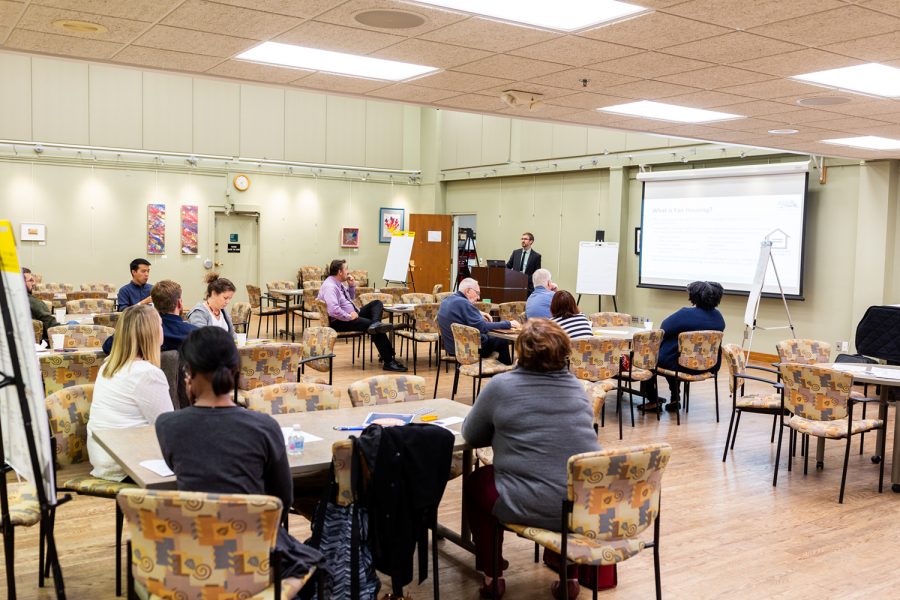Iowa City holds public forum to begin its 2019 Fair Housing Study
Iowa City held a public forum Tuesday night allowing community members to involve themselves with the early steps of the fair housing study.
Participants in a meeting about issues regarding fair housing in Iowa City listen to Kirk Lehman present on the issue at the Iowa City Senior Center on Thursday, Sept. 27, 2018.
September 27, 2018
Residents of Iowa City got the chance to contribute to the discussion of the 2019 Fair Housing Study, which will be conducted by Iowa City officials.
The city will analyze data that have been collected by various public and private organizations throughout the years to determine what barriers residents of Iowa City face when buying or renting.
The city will also consider the improvements that could be made to tear down the barriers, said Kirk Lehmann, a community-development planner. These barriers can include unlawful racial, ethnic, or class-based discrimination, he said.
“This event allows us to brainstorm with the public,” Lehmann said. “It allows us to hear many voices and the public’s thoughts on the barriers and solutions for fair housing.”
RELATED: City focuses on housing
In 2014, the last time the study was conducted, the city outsourced it to the University of Iowa, Lehmann said. The UI found several problems with the accessibility of housing in the city, he said, which eventually led to the city establishing public assistance as a source of income in 2016. This allowed unemployed individuals to rent residences without being discriminated against on the basis of income.
While the UI conducted the study in 2014, the city will conduct it this year with a team of five members, led by Lehmann.
Lehmann and the team will hold focus groups featuring representatives from relevant groups around the city, such as landlords, financial institutions, and homeowners. There will also be a survey released in the coming days available to the rest of the city.
More than 60 chairs were laid out with an easel positioned adjacent to each table for taking notes. When the event started, only a little more than a dozen people showed up, filling two of the tables.
“A major problem is that the people whom this affects, who need to be here, aren’t,” attendee Melva Hughes said. “I try to position myself at places like this to let people know what is going on.”
Hughes said that the city should better promote events such as, so the people whom the study and the following policy affects would have input.
The event began with Lehmann giving a brief presentation on the current study and the findings of the previous study.
Attendees then broke out in two small groups, where they answered three questions regarding the barriers and solutions Lehmann had noted earlier.
Discussions arose among the two groups, and they collaborated to come up with a list of the biggest problems housing in the city faced and their proposed solutions. Major topics included city planning, encouragement of privatization of low-income housing, accountability for discrimination against minorities, and the education of contractors and landlords.
People at one of the tables began speaking about societal forces that prevent fair housing.
One woman at the table said she was told by a local police officer not to move to a certain neighborhood because of crime rates.
Sara Barron, the executive director of the Johnson County Affordable Housing Coalition, corroborated her claim.
“We still have an informal practice of steering certain people away from certain areas in Iowa City,” she said.






